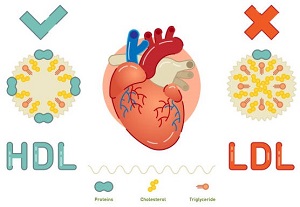Julia Child once said, "People who love to eat are always the best people." But what if you don't know how or what to eat? Most people never stop to think about it, they simply eat whatever they like or whatever is available, without considering the consequences. Unfortunately, this habit can lead to serious health issues, one of the most concerning being high cholesterol.
Understanding Cholesterol:
Cholesterol is a waxy, fat-like substance found in every cell of the body. It plays a vital role in producing hormones, and vitamin D, aiding in cell repair, memory, and neurological health. Cholesterol travels through the bloodstream in small packets called lipoproteins, which consist of fat on the inside and proteins on the outside. There are two main types of cholesterol:
LDL (Low-Density Lipoprotein) - Also known as bad cholesterol.
HDL (High-Density Lipoprotein) - Also known as good cholesterol.
When LDL levels are too high, it leads to high cholesterol. Large LDL particles may not pose a significant risk, but smaller LDL particles can be harmful to heart health. Interestingly, even if your total cholesterol is high, you may not need treatment if your HDL levels are good.
High cholesterol is often a silent condition, meaning many people are unaware they have it until they experience severe complications such as a heart attack, stroke, or cognitive decline. Risk factors include:
- Poor diet
- Obesity
- Lack of physical activity
- Smoking
- Ageing
- Diabetes
Preventing High Cholesterol Through Diet:
We've often heard the saying, and it remains a universal truth: "Prevention is better than cure." - Desiderius Erasmus. Since cholesterol is obtained solely through diet, it's essential to be mindful of what we eat. Let's explore which foods to limit and which to include in order to maintain healthy cholesterol levels.
Foods to Limit
Sugar
Saturated vegetable oils (e.g., coconut oil, palm kernel oil)
Poultry with skin
Hydrogenated and trans fats (found in fried foods, baked goods, and processed foods)
Butter
Superfoods to Include:
Legumes.
Fruits and berries.
Nuts (especially almonds and walnuts)
Fatty fish.
Whole grains (especially oats and barley)
Dark chocolate and cocoa.
Garlic, soy-based foods, and green tea
Note: If you have risk factors for heart disease, it is recommended to limit your cholesterol intake to no more than 0.2 grams per day. For individuals without heart disease risk factors, cholesterol intake should be kept below 0.3 grams per day to maintain optimal heart health.
Exercise: A Key Factor in Managing Cholesterol:
Physical activity is essential in lowering LDL (bad cholesterol) and increasing HDL (good cholesterol). Studies published in Lipids in Health and Disease confirm that exercise positively impacts cholesterol levels. The American Heart Association (AHA) recommends at least 150 minutes of moderate-intensity exercise per week to help manage cholesterol. Effective exercises include:
Running or jogging
Yoga (Kapalbhati Pranayama, Chakrasana, Sarvangasana)
Resistance training (push-ups, crunches, weightlifting, squats)
Organized sports and swimming
The Importance of Staying Active:
Sitting continuously for 30 minutes slows metabolism by 80-90%.
Being inactive for 2 hours reduces good cholesterol (HDL) by 20%.
To see significant improvements, create a balanced routine that includes both healthy eating and regular exercise.
Cholesterol Testing and Monitoring:
The American Heart Association advises adults to have their cholesterol levels checked every 4 to 6 years, starting at age 20. Cholesterol levels naturally rise with age, and men generally have a higher risk than women. However, after menopause, women's risk also increases.
For individuals with high cholesterol or other risk factors such as diabetes, more frequent testing is recommended. A lipid panel or lipid profile test measures cholesterol and triglyceride levels to assess heart health.
By making informed choices about diet, exercise, and regular health check-ups, you can significantly lower your risk of high cholesterol and its life-threatening complications.
|

